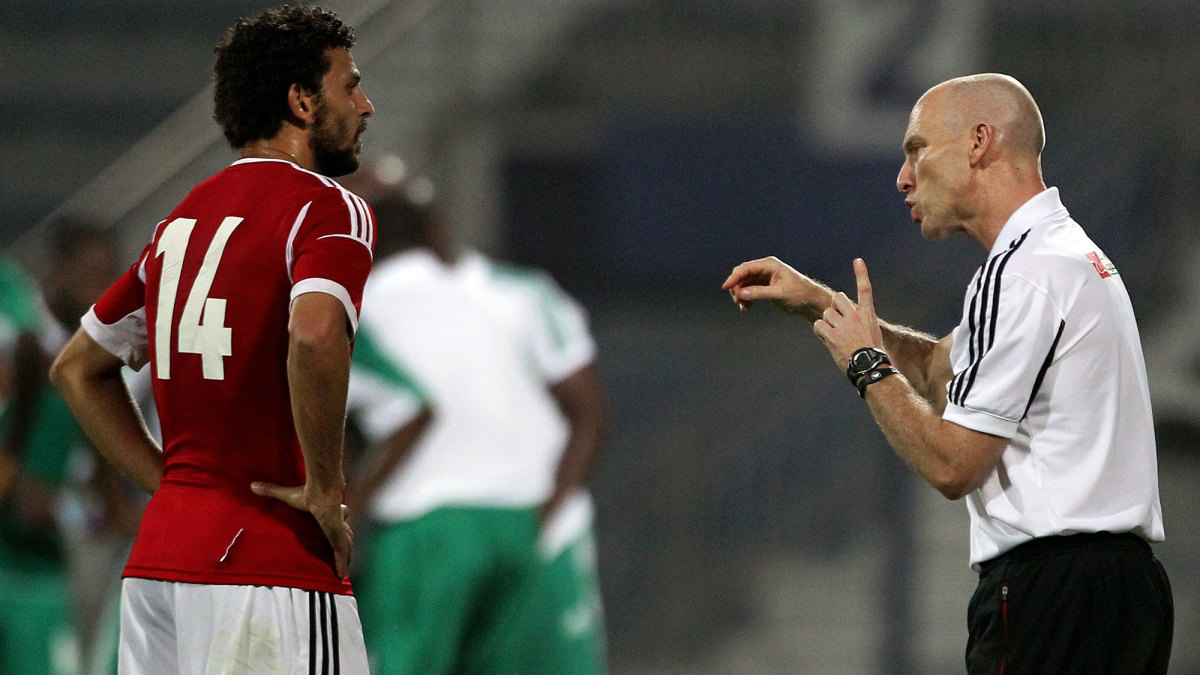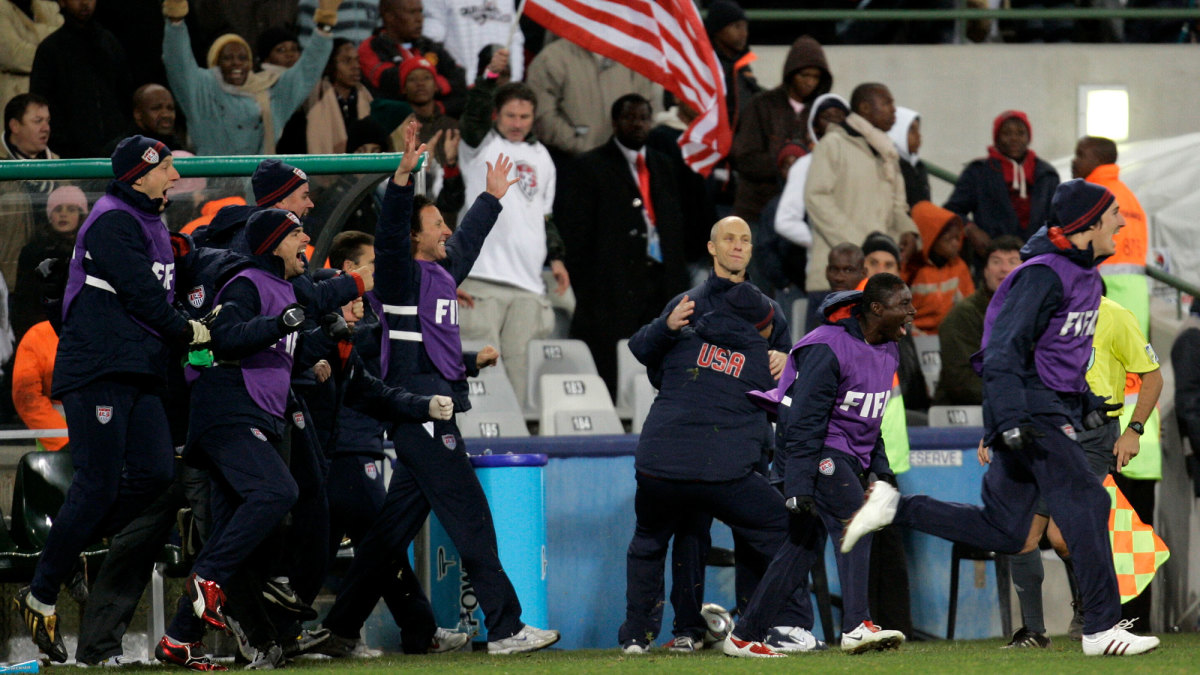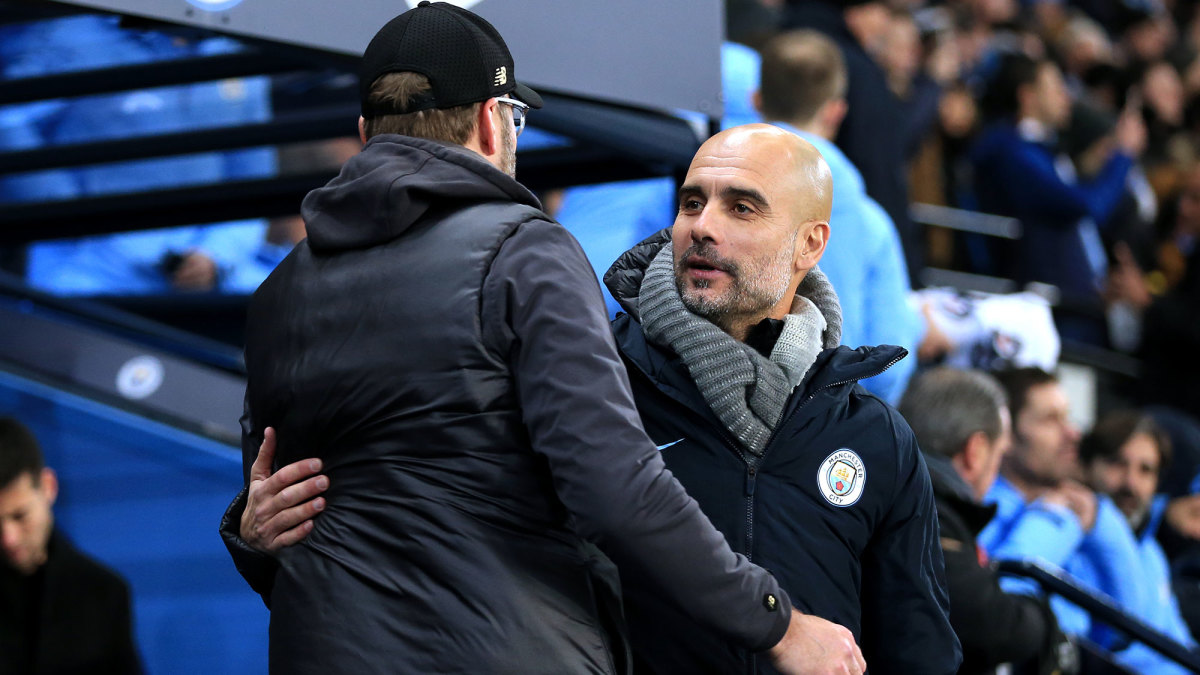Rapid Fire With Bob Bradley: A Career's Worth of Perspective and Recollections
A candid Bob Bradley spoke to the Planet Fútbol Podcast for more than an hour this week in a way that Bradley can do—with honesty about his career, the people he has known and observed and his thoughts on the sport. Look for a story from the interview on Friday, but for now here’s the Rapid-Fire Quiz–a series of questions regarding career superlatives and beyond–Bradley, whom I've been covering since both of us were at Princeton (I was a freshman in 1992, and Bradley was the men’s soccer coach at the time) took as part of the conversation.
Answers are lightly edited for length and clarity.
SI: What is the most memorable victory of your career?
Bradley: I'll say the game against Algeria [when Landon Donovan scored the game-winner late for the U.S. in the 2010 World Cup]. It was the culmination of that cycle. That team understood how to keep playing until the end all the time, and the feeling that we all shared on the field after that game, having won the group [ahead of England], that was a special moment.
SI: What is the most memorable defeat of your career?
Bradley: Kumasi, 6-1, Ghana over Egypt [in the qualifying playoff for World Cup 2014]. The amount of pressure that was on the Egyptian players, everything on them on that day, they weren't themselves. And the only game that I've ever watched where I had a similar feeling was when Brazil got crushed by Germany [in 2014]. That day I just looked in the eyes of so many of the players, and I just saw a blank. And they were incredible guys.
This is supposed to be rapid-fire, but I will give you a really important story. On the bus back to the hotel after the game, I realized that if they had their way, they would all just go back to their rooms and that would be it. We were staying in a small hotel in Kumasi, and I told them that when we got back we were going to meet up on the floor where all the players had their rooms. And I told them how proud I was of them. I told them that I knew how much they loved their country and that they weren't themselves that day.
The pressure of everything that was happening in the country that day had just been too much. But nothing could ever take away from everything that they had put into it. We had won the six games in our group. That was the only game we lost in qualifying. And I just wanted them to still know how I felt about them.
I said, ‘Look, we still play Ghana [in the return leg]. There's a small chance, and it's pretty likely that when we get back my head will roll. But I'm going to tell all you guys right now, I'm going to fight like crazy to stand with you one more time. And if we get that chance, we're going to still go after that game and try as best we can to turn this thing around.’
So the next few weeks were crazy. It did look at some moment like I was going to be out the door. But maybe the fact that from day one in Egypt, when [the] Port Said [stadium massacre] happened and everything else, I never looked to leave, maybe in some way that helped me. And we beat Ghana. 2-1 wasn't enough.
But the feeling of that group after the game, and I knew that for the rest of their lives, all those guys, they're Egyptian, that was their country. As much as I was lucky to be there for two years, it wasn't my country. So to take the blame, take the responsibility, for me it was no problem because I wanted those guys always to be respected for what they had done during that time.
So that game will live with me forever.
SI: Before we did this interview, I went back and read the magazine story I wrote in 2013, right before that 6-1. I had spent a few days with you in Cairo and felt like I got at least a sense of how powerful that connection was between you and your Egyptian team and the Egyptian people. So thanks for sharing that.
Bradley: I'll still get sometimes in an Uber, and I'll have a driver and I'll see that they're looking in the rear-view mirror, and they'll say to me in a shaky, nervous voice: ‘Are you Bradley?’ And I'll say yes. And they'll say, ‘I'm Egyptian,’ which certainly at that moment they don't need to tell me because I can spot Egyptians from a long ways away.
And they're incredible, because every one of them will get emotional and say that I was there during a very tough time and that they know I gave everything for their country. They're proud people, and they're emotional people. And I'll never forget that part.

SI: Who are the three best players you've ever coached?
Bradley: Oh boy. Three best players? Hristo Stoitchkov. End of his career. Personality, power, intelligence, passion. The discussions that we had about his Barcelona teams, how they played, those things have always stuck with me. And then the second one, it's interesting because it's Mohamed Salah. And I started to work with Salah when he was 19.
At the very beginning, I looked at him and the first person I thought of was Hristo because of the power and the speed and the explosiveness and left foot and the ability to come from outside in and do incredible things. So I showed Salah clips of Stoitchkov and talked about things that I thought made Hristo so special.
And it's been amazing for me to watch Salah develop as a player and as a person. I hear from him all the time. He's an incredible guy, and I'm really proud of him. So I would say those two.
No. 3 gets hard. I coached Youri Djorkaeff. He’s the only player that I ever coached who won a World Cup. Obviously, Carlos Vela is a similar player to Hristo Stoitchkov and Mohamed Salah. In the league, he's been incredible. Peter Nowak, Lubos Kubik, Landon [Donovan], Clint [Dempsey]. [Mohamed] Aboutreika. I'm not sure.
SI: Who is the best leader you've ever coached?
Bradley: I just said Aboutreika in the last list, so maybe I'll stick with him.
When I arrived in Egypt, people said he was too old. I didn't pick him for the first game. We played a friendly against Brazil in Qatar. Instead of complaining about it, he publicly said—because he wasn't playing much at Ahly at the time—'I'm not playing much. I have to show Bob what I can do.’
And then he started to play a little bit and immediately I thought: he's still different than all the other players. And Port Said happened. And we marched. And a day later I went to the memorial, and I saw the players and I saw their faces. And I knew what they had seen in the locker room [where fans died that day].
And I spoke quickly to Treika that night and said, ‘I'm going to come to training at Ahly next week, and then I want to speak to you.’ And I went to Ahly, and at the end I said, ‘Can we find a time to speak?’ And when no one knew about it, he came to my hotel and the two of us sat upstairs and we talked about the possibility of the World Cup, and he brought a T-shirt that he gave me.
And it was a Brazil 2014 T-shirt. And I said at the end of that meeting, because he still wasn't playing 90 minutes: ‘Look, I don't know whether you're going to play 90 minutes or 45, but I need you in this.’ And he was incredible. He got his fitness back. He played at an incredibly high level. Everyone looked up to him. He's a fantastic man. And so just for everything that he represents, I think that's Treika.
SI: What is the best team you have ever coached against?
Bradley: For sure it's the Spain team [that Bradley’s USMNT beat 2-0 in the 2009 Confederations Cup semifinals]. Not because we beat them, but because if you think of what happened during that whole period of time. They won the Euros in 2008. They won the World Cup in 2010, they won the Euros again in 2012.
When you think of everything that went on in that period for both Barcelona and Real Madrid, where so many of the players played their club football, and just the pure quality of those players and the kind of football that they played. When we beat them in Bloemfontein, they had [gone a world-record 35 matches unbeaten and won 15 in a row].
And for all the people who said to me then and say to me now that the Confederations Cup didn't mean anything to Spain: I went to see Barcelona train at UCLA later that year. And Xavi and Puyol and Pep [Guardiola], all of them came up to me and talked about our team and the game.
Trust me, the Confederations Cup meant something to all those guys.

SI: What is the best rivalry you have ever coached in?
Bradley: U.S.-Mexico. The history, obviously seeing the important games, the way different guys on either side have stepped up in different moments. What it means when you're in qualifying in the games against Mexico. What it means to try to win the Hex. For all of us that have been lucky enough to be involved in that rivalry, that's always special.
SI: Which player in world football do you get the most pleasure out of watching today?
Bradley: The "today" part means that, that I have Wyscout and InStat, so when I watch guys today, that doesn't mean that they're still playing today.
So I'm going to say Xavi. His pure ability to find space and the easy way that he gave his team fluidity and rhythm, the natural way of receiving and always turning the right way. The efficient use of touches, the timing, the intelligence—as special as anything I've ever seen.
SI: Who do you most admire in world football today and why?
Bradley: As a pure coach, [Pep] Guardiola. I certainly want to mention his name today, because in this global pandemic Pep lost his mom. I've met Pep a few times. I don't know him well. But in the couple of times I met him, I appreciated his passion and his love of the game. I thought that was great.
And then if you're talking about coaches in the world these days, as soon as you say Pep, then you have to say [Jürgen] Klopp. I talk about football a lot in different ways, but sometimes in its simplest form I talk about how as a team it's like, where is the bar between Barcelona and Liverpool, right?
Barcelona is the team in terms of controlling the game, positional play, just a feeling that they could always have the ball. Liverpool: So dynamic. And it was true when Klopp was at Dortmund as well. Dynamic.
He talks about more heavy metal, and so when I gave you some of the things that I think about in football these days, I always try to think about how in some moments can you be a team that has control and understand positional play, but in other moments how can you be more free-flowing and more fluid and more vertical and more dynamic?
And so I've always sort of used this analogy. I used to tell my team in Stabaek that every team has to figure out where you are between Barcelona and Dortmund. And now I'll say between Barcelona and Liverpool. And I actually think the same thing works. If you were to just take Guardiola and Klopp, as a coach I think there's a part of me that I love the details of the game.

People who have watched training sessions see at times where I'll stop things and correct the way a guy is receiving the ball, which foot he receives it with. In this back and forth I had with Benny Feilhaber the other day, he was nice. And he said that with all that he learned from me at the national team that the preseason in 2018 [with LAFC] he says that was the most he ever learned about football.
Because he felt that in a club environment where you had things every day that there was so much that opened up his mind. So I always believe that that's an important part of coaching.
But then if you go to Klopp, I believe in the part of coaching that's still human. That's real, that's laughing, that's hugging, that's making sure that guys understand that the game is not perfect and that you as a team, you've got to have identity and personality, and you've got to go for it.
I talked about our U.S. teams and look, I've read all the things that everybody said. I know all the people that said that we played an ‘empty bucket’ or something. And I sometimes say that actually [with] Clint and Landon, in reality we played a 4-2-2-2. And if I had told everybody that years ago, everybody would have thought I was a genius.
But I just said we played 4-4-2, but we had really good ideas on how important it was for Clint and Landon to move into those pockets, or Benny if that's where he played, and how we could play through lines and find those guys in good positions.
And they would have attackers in front of them and we would get width from outside backs. And so I've always tried in my way of coaching to find a balance between the details that I love and the things that need to be coached in detail every day with a part of personality and a part of being human and a part of saying I'm wrong.
And in my worst moments, yeah, I know what I look like. I know the moments when I cross the line and people think I'm an a**hole. But I'm quick to realize that. I'm quick to tell people, ‘Look, sorry. You know, that wasn't the right way to handle it.’
But I think that's real. I learned a long time ago that as a coach you can't be afraid of being yourself. You can't be afraid of making mistakes. You can't be afraid of crossing the line. And I think that Klopp's got all of that. So I think that if you just talk quickly and finish on that balance between the incredible detail of Pep and what he's been able to get his teams to do with this humanness of Klopp.
When we're looking at what's going on in the world right now, all of us have real feelings. And perspective. And I'm lucky, I've been outside the country. I've spent a lot of time in Africa. I know what it's like in not only in Egypt, but I know what it's like in all these places.
I spent five days in December in Ghana at a little academy, and those were incredible days to see these kids. And so humanness and perspective that you know, right now we've got people—doctors, nurses, healthcare workers, grocery people, truck drivers—so many people who are out and about keeping us going.
And you know a little bit about my parents, but in its simplest way of saying it, my mom's dad was a plumber and my dad's dad was a carpenter, and my dad worked on both sides of all of that before he got into something that was more heating, ventilation and air conditioning.
But this idea of real people and people that don't have things that you have, and what their lives are all about. Even in this world of quarantine, it's a lot easier to do it if you live in certain places and if you've been lucky enough in your life than it is in other situations.
And that clearly impacts the numbers that we see around the country. So the humanness and the perspective. The game is special, and those of us that get to work in it every day are really lucky. But you can never lose the connection with all of the people in the world who just—to see a game, to meet a player, to kick a ball—man, that's so special to them.
And so to me that's always important. So even in my moments when I lose it a little bit, I never lose perspective.
